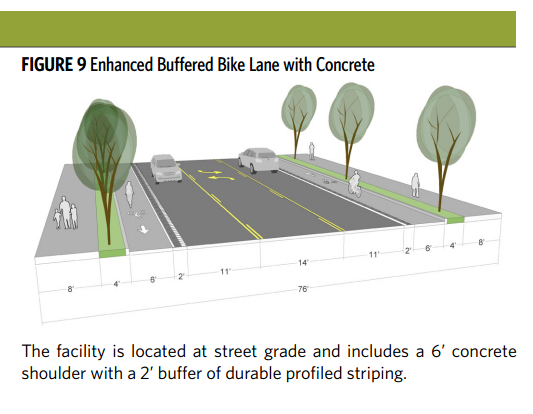
(Image: Google Street View)
East Portland’s most prominent advocacy group is unanimously opposed to the state’s current plan for outer Powell Boulevard, its top staffer said Thursday.
“Every one of our transportation advocates — from pedestrian to bicycle to transit to overall transportation — was in disagreement with their decision and they want a separated bike lane on Powell,” said Lore Wintergreen, advocate for the East Portland Action Plan.
“ODOT’s message to the community advisory group and to me was basically ‘It’s our way; it’s our highway.'”
— Lore Wintergreen, East Portland Action Plan
As we reported this morning, the Oregon Department of Transportation says it’s rejected raised bike lanes on outer Powell as inviable and plans to move ahead with what it called “buffered bike lanes,” which project managers said might or might not include some sort of vertical barriers.
Powell Boulevard is within Portland and Gresham city limits but controlled by the state government. It carries about 20,000 cars and trucks per day in the project area east of Interstate 205.
Wintergreen called BikePortland Thursday to say that EPAP volunteers had learned about ODOT’s decision only “a week and a half” ago themselves.
“ODOT’s message to the community advisory group and to me was basically ‘It’s our way; it’s our highway,'” Wintergreen said.
“They didn’t talk about it until the last meeting,” she continued. “They came to the last meeting basically saying ‘This is what we’re going to do and here’s why.’ … Their assumption was that they could kick the children out of the house if they could not get along with it. But these people are not children.”

(Image: ODOT)
Wintergreen, who essentially functions as a staff community organizer paid by the City of Portland Office of Neighborhood Involvement to support the agenda of East Portland neighborhood advocates, said she and EPAP volunteers aren’t convinced that protected bike lanes are actually inviable on Powell.
“City engineers that I’ve spoken with think there are potentialities to make this safer, and they think they’re viable,” Wintergreen said.
She said that in the last week and a half, EPAP has gotten signoff from multiple legislators and the office of Gov. Kate Brown to convene a meeting between city and state engineers and reconsider the possibilities on Powell.
The reconstruction of Powell between 122nd and 136th avenues is possible because a coalition of seven state legislators struck a legislative deal in 2015 to get $17 million for the street.
Advertisement
EPAP feels that some sort of vertical barrier is needed on Powell, Wintergreen said, because if it’s not there then people will drive into the bike lanes.
“People are very accustomed to passing on the right, because they feel they can do it,” she said. “There is a need to have a separated bike lane on Powell to keep people safe.”
One problem is that with more than 300 driveways and side streets in the project area, a protective curb would look like “Morse code,” as ODOT engineer Matt Freitag put it.
That’s part of why a raised bike lane has been seen as a reasonable option. (Raised bike lanes crossed by numerous driveways are common on lower-density bike-friendly commercial districts in the Netherlands, for example.) But a raised lane might make stormwater drainage more difficult or expensive, ODOT says.
Mike Mason, an ODOT project manager, said in an email Thursday that although he had on Wednesday suggested that anything more than a slightly raised stripe might be inviable because of sweeping equipment and other issues, ODOT still sees a possibility for getting a physical barrier between bike and car traffic.
“The current plan is for the ODOT team to continue working with colleagues at the City of Portland to look at treatments in the buffer zone of the enhanced buffered bike facility that may provide some separation or protection to people bicycling,” Mason said.
Wintergreen said her understanding is that ODOT and city staff have already “agreed to disagree” about what’s possible on Powell.
“East Portland Action Plan members don’t agree to disagree,” Wintergreen said. “They feel that the safety of people is more important than relationships at this point.”
— Michael Andersen, (503) 333-7824 – michael@bikeportland.org
Our work is supported by subscribers. Please become one today.

